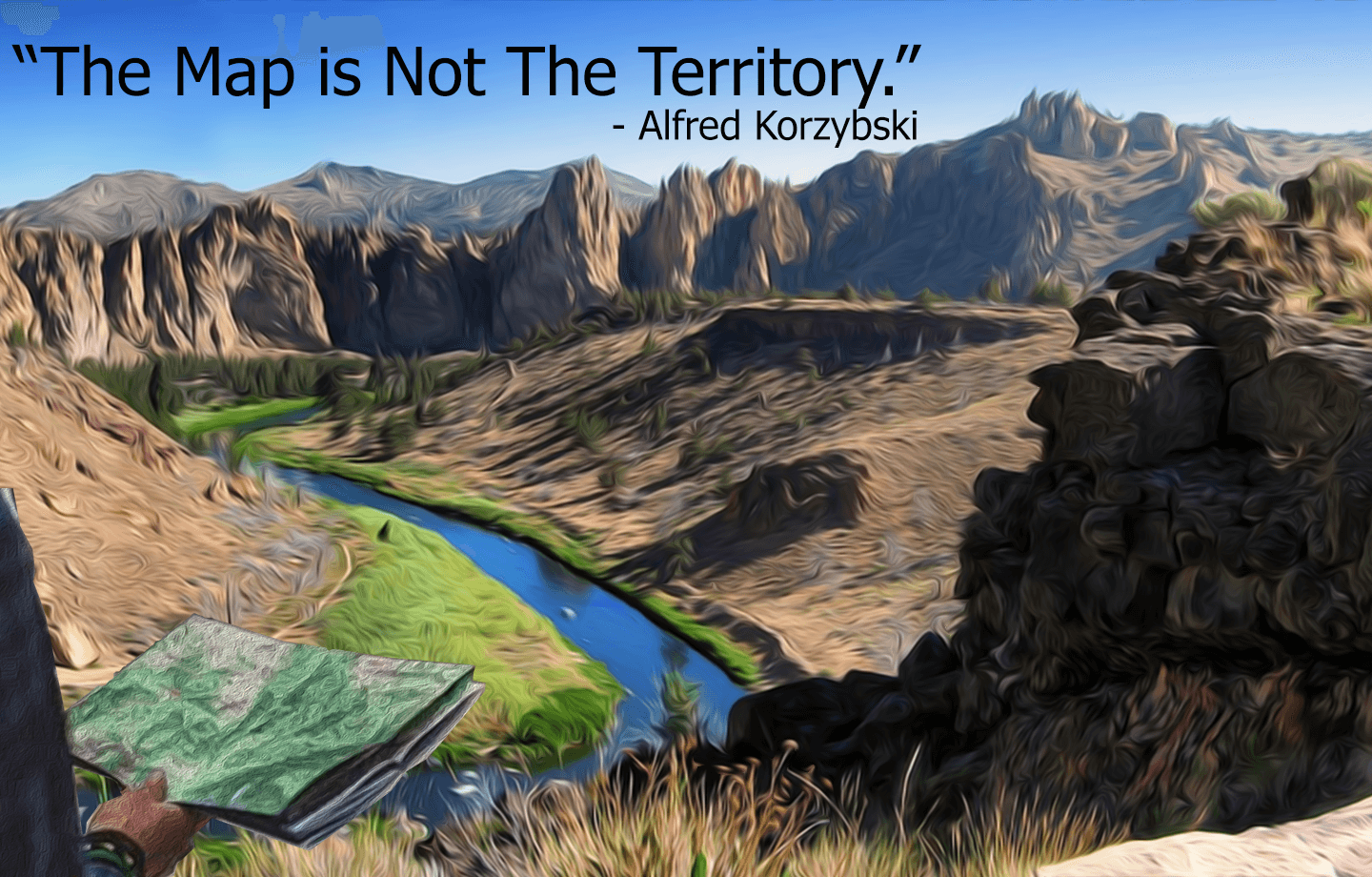
- This event has passed.
The Map Is Not the Territory
Sunday, February 7 @ 10:30 am - 11:30 am


The title of this sermon is attributed to Polish-American scientist and philosopher Alfred Korzybski and became a premise in Korzybski’s General Semantics and in neuro-linguistic programming. For me, it becomes a springboard for explaining my liberal worldview and theology. Notes on the phenomenon of projection, imagination, and poetry. Reverend Furrer will be preaching.
how to attend
• To virtually attend, please Zoom in using room number 989 3107 9078.
• To phone into the service, call 669-900-6833, Meeting ID: 989 3107 9078.
For those joining, please mute as soon as you enter the room, so everyone can hear. Please note, the services will be recorded, but at this time, there are no plans to share the recording.
More Information
Religious Education for children and youth begins at 9:30 a.m. in the same room! Learn more here.
If you don’t have a chalice, but want to light one, check out our Making a Chalice at Home page.
Service is followed by Coffee Hour.
Sermon Audio
The Map Is Not the Territory
Sermon Text
Today: the Five main points of my ministry: (This is my theology in five sentences; my liberal philosophical worldview in a nutshell.)
- The Map is Not the Territory.
This expression, “the map is not the territory,“ is attributed to Polish-American scientist and philosopher Alfred Korzybski and became a premise in Korzybski’s General Semantics, and in neuro-linguistic programming. Korzybski’s point is that individual people in fact do not in general have access to absolute knowledge of reality, but in fact only have access to a set of beliefs they have built up over time, about reality. So it is considered important to be aware that people’s beliefs about reality and their awareness of things (the “map”) are not reality itself or everything they could be aware of (“the territory”).
Bernard Loomer: my idea of reality is not reality.
(More concretely) My idea of Mike Radow is not Mike Radow.
Religions = maps, not reality. à But they’re pointing to reality.
There’s a well-known Zen saying: “Don’t confuse the moon with the finger pointing at the moon.” Language is like a finger pointing at the moon, says the koan. Language is as distant from reality as the finger is from the moon.
- The Power of Projection.
We see through lenses. More often than not we see more of the lens than of “objective reality.”
“The world is going to hell” à This tells us more about the person saying it than it tells us about the world.
“People will cheat you whenever they get the
chance” The speaker is a cheater.
Consider George W. Bush and Osama bin Laden. In many ways, the two leaders were mirror images of each other, but didn’t see it. And they became involved in mutual projection. Another example: Hitler accused the Jews of trying to conquer Europe for profane and insidious purposes à this is pure projection. That’s what Hitler wanted to do! The mob that stormed our Capitol, projected their propensity for mayhem onto antifa, who were nowhere near the scene of the crime.
How to transcend it? (C.G.Jung: “All relationships begin with projection; some evolve into relationships….”)
- The Power of Imagination
Albert Einstein once wrote, “Imagination…is more important than knowledge. Knowledge is limited. Imagination encircles the world.”
We are co-creators in life: According to the Bible, God created humanity in God’s own image, in the image of God he created us; male and female he created them. [Gen 1:27] Image–ination is the key; people have evolved—out of the mud. The creative power, the Spirit, that generates and informs life has endowed people with this incredible facility: imagination. Imagination gives us the ability to communicate symbolically. It gives us the power to craft A Mid-Summer Night’s Dream and the Brandenburg Concertos; to imagine them. When we get in touch with our imaginative creative power, we are contacting the divine within. If the first stages of human awakening involved separating ourselves from nature, developing our sense of autonomy as a species and discovering our ability for remaking the world, the next stages of evolution will require reintegrating ourselves with nature, exploring our deep bonding with one another and with the cosmos and developing our capacity to act in harmony with the universe. Shakespeare, Bach, Alfred Korzybski—they have all been into this.
As co-creators in life, we have the power to organize and order life however we want to. We can organize it to enforce conformity, predictability, and profit, or we could organize around self-awareness, creativity, and sustainability. We have a choice. We have imagination, which means we have a choice.
- Religious myth =Poetry
Mahatma Gandhi wrote, “I believe in the fundamental truth of all great religions of the world. I believe that they are all God-given and I believe that they were necessary for the people to whom these religions were revealed. And I believe that if only we could all of us read the scriptures of the different faiths from the standpoints of the followers of these faiths, we would find that they were at bottom all one and all helpful to one another.”
It’s all here & now. Preoccupation with the afterlife is a trap; an error; an illusion. All the religious language is pointing to realities that exist here among us right now. As is written in the Gnostic Gospel of St. Thomas, “The Kingdom of Heaven is spread upon the earth and people do not see it.” [Gnostic Gospel of St. Thomas, Saying 113]
Fundamentalists keep confusing the map (language) with the territory (reality); thus, they think of eternity as a long, long, long, long, long, long time. But it is not. Eternity has nothing to do with time; it is out of time. And what’s time? Plato defined time as “the moving image of eternity.” Such a description recognizes eternity is right here when we learn to see it in our midst. Spiritual practices are those practices—like the General Semantics of Alfred Korzybski—that help us learn how to see the eternal and the glorious and the divine in our midst.
“It is difficult to get the news from poems
Yet men die miserably
every day for lack
of what is found there”
So wrote the Unitarian poet, William Carlos Williams, in his epic work “Paterson,” about the middle-class city in New Jersey where he lived. He wrote it over many years; he described his research, his method, his creative process, this way: “I started to make trips to the area. I walked around the streets; I went on Sundays in summer when the people were using the park, and I listened to their conversation as much as I could. I saw whatever they did, and made it part of the poem.”
Countries do not usually think of poetry as providing them with national security, but it does; it connects people with a particular place: Paterson, New Jersey for William Carlos Williams; Witter Brynner for Santa Fe, Mary Oliver for Cape Cod.
Religion is poetry. The Bhagavad-Gita. – described by Gandhi as “an allegory in which the battlefield is the soul and Arjuna, man’s higher
impulses struggling against evil.”
The Song of Songs in the Jewish Scriptures –
Rise up my love, my fair one, and come away.
For lo, the winter is past;
the rain is over and gone;
the flowers appear on the earth;
the time of the singing of birds is come….
Set me as a seal upon thy heart
as a seal upon thine arm:
for love is strong as death.
Many waters cannot quench love,
neither can the floods drown it…
for my beloved is mine,
and I am his….
Arise my love, my fair one,
and come away.
Plato’s Myth of the Cave
These are beautiful images of the human condition—
A Midsummer Night’s Dream, Act V
Handel’s Messiah
“Our Town” by Thorton Wilder
Studying religion as poetry enables one to see its imagery more easily:
e.g., The Great Divorce by C. S. Lewis
Characters all find themselves on a bus ride
to heaven. They disembark at a place
like the Taos basin – the
passengers are met there by spirit guides
à in each case, by their worst enemy!
People prefer being right (i.e., “correct”) in hell to Reconciliation (heaven-on-earth) here & now
Earl Fleeheart knew the poetry, and he
spoke it as, together, we approached his death— Wow! What a privilege to be a part of
that experience.
Unitarian Universalism understands religion as poetry and poetry as religion
Consider a poem of ee cummings’s that I often
read at weddings:
love is the every only god
who spoke this earth so glad and big
even a thing all small and sad
man, may his mighty briefness dig
for love beginning means return
seas who could sing so deep and strong
one querying wave will whitely yearn
from each last shore and home come young
so truly perfectly the skies
by merciful love whispered were,
completes its brightness with your eyes
any illimitable star
Consider Walt Whitman, Henry Wadsworth
Longfellow, William Carlos Williams, or
Ysaye M. Barnwell, composer and arranger for
Sweet Honey and the Rock.
- In keeping with the idea thatit is all here now, that this is it, consider that in Western tradition, the verb To Be is the name of the deity.
Exodus 2:
And who shall I say sent me? Tell them “I am that I am” sent you.
“So what is God’s self-definition in the Bible? Did God say, “I have always been, and I always will be?” No. That would have given reality to the past and the future. God said: “I AM THAT I AM.” No time here, just presence.” God is presence. “Be still,” wrote the Psalmist, “and know that I am God.”
God = the verb “to be.” The sine qua non of our lives. Being. Being alive. Being awake.
There’s a story about the Buddha: When people encountered him they would often ask, not “Who are you?” but “What are you?” “Are you a saint?” “No.” “Are you a god?” “No.” Well, what are you, then?” To which the Buddha replied, “I’m Awake.”
The religious impulse is the be awake; to awaken to our human potential—which is truly amazing, and all the more amazing when linked with the shared efforts of many spiritual siblings in the service of the sacred—the sacred earth, for instance.
To Be is to be Awake. Alive, here in the present moment. To experience reality unmediated by language—the territory instead of seeing only the map. Or, as it says in our UU Purposes and Principles, “Direct experience of that transcending mystery and wonder, affirmed in all cultures, which moves us to a renewal of the spirit and an openness to the forces that create and uphold life.”
All this religious literature and poetry is designed to help people see life more in terms of its verbs and less in terms of its nouns. See the movement,
the pattern,
the interconnected whole,
the interdependent web.
To look beyond the moving image of time (or through it), to the eternity in the midst of which we also live— which is available to us when we wake up. Religion’s all about helping people become aware of that and get hip to it by organizing their life to see in this unified, holistic manner.
So: The map is not the territory.
Most of what we see is a function of our own projection.
The key to withdrawing our projections is imagination.
Think of religious myth & language as poetry.
God is nearer to you than your nose to your face; God is within us, it is our consciousness à to Be is to know God; it is that simple (and difficult).
So it is. And so may it be. Amen.


